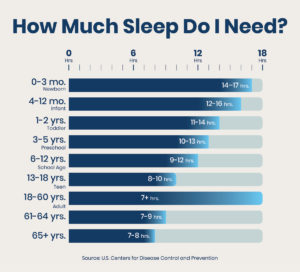Importance of Sleep Explained (Understanding the Benefits of Sleep Health)

Importance of Sleep Explained: Understanding the Benefits of Sleep Health
Have you been nodding off during those important work meetings or falling asleep at your desk? What about skipping the gym because you can’t muster enough energy to get on the treadmill? If you’re feeling more ho-hum than get-up and go, you might be suffering from a lack of sleep. Although you will spend about one-third of your life doing it, the importance of sleep is often ignored.
Getting enough sleep is even more critical to your health than following a strict diet or daily exercise routine. Quality sleep is the foundation for good health. Catching the right amount of ZZZs is vital for your body to rebuild tissues, replenish cells, and reclaim lost energy, plus it helps you catalogue memories from the day and retain the knowledge you captured each day.
In this guide, we’ll break down the importance of sleep and illuminate the many reasons why we need sleep, how much of it we need, and the benefits of getting regular shut-eye.
How Does Sleep Work?
As soon as you head to the coffee shop to begin your day, your body is already preparing for sleep. While you are awake, your body produces a chemical called adenosine which consistently accumulates throughout the day and eventually causes the sleepiness signaling that you’re ready for bed.
Your sleep and its daily relationship with wakefulness are controlled by two systems: your biological clock (or circadian rhythm) and your sleep drive.
Your circadian rhythm is the biochemical cycle that repeats roughly every 24 hours and governs sleep, wake time, hunger, body temperature, hormone release, and other subtle rhythms that mesh with the 24-hour day. Your sleep drive (the need for sleep) dictates the amount and degree of sleep you need based on how long you’ve been awake. Think of your sleep drive like hunger; it builds throughout the day until it you get the rest you need.
Why Do We Need to Sleep?
The human body regulates sleep the same way that it regulates eating, drinking, and breathing. While there are many theories out there that attempt to examine the biological reasoning behind the human need for sleep, there is no single hypothesis that definitively provides a scientifically-proven verdict.
Although we often think of sleep as a time when our bodies and brains shut down and go into autopilot mode, it’s actually quite the opposite. While you’re asleep, your body is hard at work, restoring energy, repairing cells, and releasing essential hormones. Sleep serves as the ultimate time to heal and recover so you can take on the next day feeling rejuvenated and sharp.
How Much Sleep Do We Need?
Knowing that we spend about ⅓ of our lives asleep, you’re likely wondering, how much sleep do we really need? The perfect amount of sleep will vary by age and by person, but there are scientifically agreed upon by consensus ranges you can follow to ensure you’re catching enough Zs.
The average adult needs between 7 to 9 hours of sleep to allow the brain and body to repair and restore overnight. For teens, children, and babies, the recommended hours of sleep per day increase. Check out the chart below to determine how much sleep is suggested for your age group.

What Happens When We Don’t Get Enough Sleep?
If you’ve ever spent a night tossing and turning, sleeplessly watching time tick by, you know just how cranky, groggy, and under the weather you’re going to feel the following morning. Losing out on the expert-recommended 7 to 9 hours of sleep your body needs on a regular basis does far more damage than merely making you feel lethargic and grumpy. There are a myriad of harrowing long-term effects of sleep deprivation that could take a serious toll on your well-being.
If you’re wondering just how crucial the importance of sleep is on your body, check out some of the health problems associated with poor sleep:
- Heightened risk of diabetes: The human body’s natural reaction to sleep deprivation can sometimes resemble insulin resistance—a precursor to type 2 diabetes. Insulin is responsible for helping the body convert glucose into energy and breakdown fats and proteins. When the body resists insulin, your cells fail to use the hormone efficiently, which then results in high blood sugar levels.
- Heightened risk of high blood pressure: Prolonged lack of sleep could impair the body’s ability to regulate stress hormones and lead to high blood pressure.
- Impaired memory cognition: Many studies show that by getting only five hours of sleep a night, you can adversely affect your brain’s ability to remember important information. Sleeplessness can lead to encoding failure which manifests in behaviors such as forgetting where you left your keys or the date of a birthday party you’re supposed to attend.
- Stunted concentration and problem-solving skills: Did you know that drowsy driving has been proven to be just as bad as driving drunk? Throughout history, sleep deprivation has been the culprit for many disasters, including the Three Mile Island nuclear disaster, the Exxon Valdez oil tanker spill, and the Bhopal, India gas tragedy. Though these were related to shift work and less associated with sleep deprivation, it still shows that general sleeplessness leads to poor performance and a significantly-decreased ability to concentrate and problem-solve.
- Weakened immune system: Your immune system serves as your body’s defense mechanism, protecting you from foreign invaders looking to divide and conquer. Without proper sleep, your immune system can become weakened and have trouble fighting off invaders. This can cause you to get sick more often and suffer through a slower recovery time when you do.
- Heightened risk for heart disease: When you’ve gone too long without consistent, lengthy, deep sleep cycles, certain things occur which prohibit the body from reaching extended restoration cycles during which heart rate and blood pressure are lowered. Over time, this can lead to elevated blood pressure during the day and a greater risk of cardiovascular issues down the road.
- Heightened risk for weight gain: According to The National Institute of Health (NIH), short sleepers on average consumed 500 more calories a day than people of the same age who slept 7 hours each night. When you get less sleep than ideal, you’ll experience a different balance of hormones in your body that can lead you to crave unhealthy food with more calories.
What Are The Benefits of Good Sleep Health?
The benefits of sleep effectively hammer home the importance of sleep—both keenly detail how crucial consistent slumber is for your everyday life, health, and well-being. Let’s take a closer look at the many reasons why you should prioritize your sleep health.
Improved Physical Health

While you’re asleep, your body is taking the time to rest, recover, and rebuild so it can perform at its peak the next day. By healing damaged cells, boosting your immune system, and recharging your cardiovascular system, your body gets the reboot it needs to wake up feeling revived and alert for your daily activities.
Improved Weight Control

When you forget to count those sheep each night, your circadian rhythms get out of sync and begin to harm your hormone levels. Hormones regulate everything from your menstrual cycle to your hunger levels. When your body doesn’t get enough sleep, its ability to know when it’s satisfied can become impaired. The hormones responsible for making you feel full or hungry (leptin and ghrelin, respectively) can fall out of sync when you’re tired and cause you to feel hungrier than you should.
The loss of sleep can affect the function of a region of the brain known as the hypothalamus, which regulates appetite and the release of energy.
When the body is well-rested, your hormones remain balanced and your appetite is naturally controlled. With that, your temptation for unhealthy foods tends to go away as well.
Boosted Emotional Well-Being

If you’re feeling cranky due to lack of sleep or are suffering from a sleep disorder, it’s difficult to start your day on a positive note. A lack of sleep can make it hard to regulate your emotions, putting you in an all-around bad mood which can cast a shadow on all your daily activities. Your mental health is just as important as your physical health, so it’s imperative that you care for your emotional wellbeing as thoughtfully as you do for your body’s.
According to a Harvard Medical School study, taking the necessary steps to ensure adequate and consistent sleep will lead to improved mood and healthier emotional well-being.
Sharpened Recall and Cognition

When your sleep tank is running close to empty, you’re likely going to have difficulty creating new memories and recalling old ones. This is because sleep plays a significant role in learning and memory-recalling skills. With too little sleep, you may find it near impossible to focus on or understand new information because your brain simply doesn’t have enough time to retain it. With more regular sleep, you can sharpen your brain’s ability to learn and preserve information.
Heightened Productivity

According to the National Sleep Foundation, getting enough sleep every night can have a remarkably positive effect on your work productivity. Although it can be difficult to balance a busy job and a demanding sleep schedule, doing so can allow you to reap the following benefits:
- Improved concentration
- Increased ability to refocus
- Lowered feelings of burnout
- Improved decision-making
- Decreased error-making
Wrapping Up
Beyond the importance of sleep and the benefits of good sleep health, there are a myriad of reasons why you should invest in your sleep schedule and perfect your sleep hygiene. Sweet slumber is one of life’s necessities, helping our bodies grow, repair tissue, replenish cells, retain and catalogue memories and learnings, and restore energy. Something so vitally important to your overall health and longevity is nothing to take lightly. Get to sleep early and often. Happy snoozing!
“Sleep Disorders and Sleep Deprivation: An Unmet Public Health Problem”. National Institutes of Health. https://www.ncbi.nlm.nih.gov/books/NBK19940/